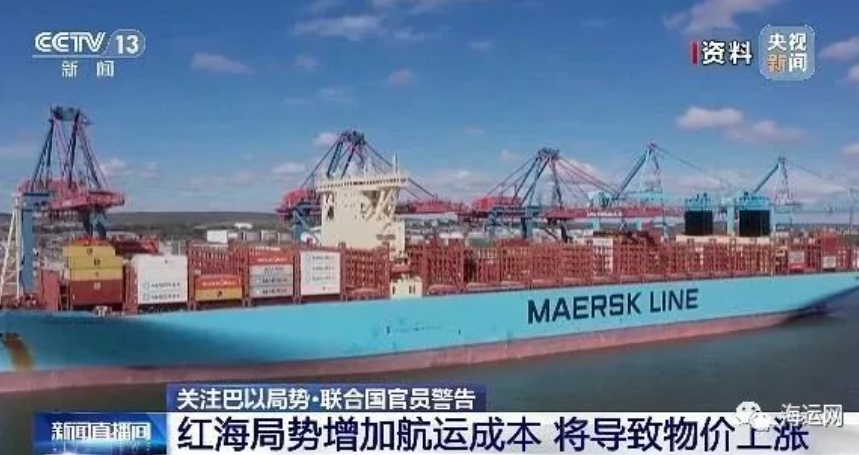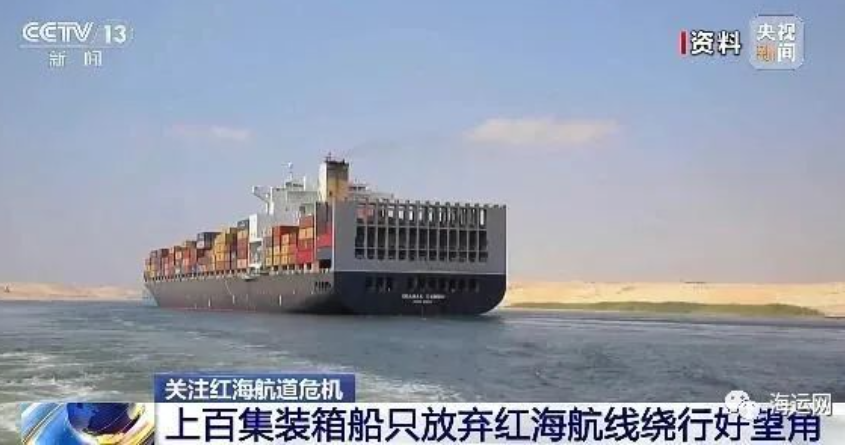Since mid-November, the Houthis have been carrying out attacks on “vessels linked to Israel” in the Red Sea. At least 13 container liner companies have announced that they will suspend navigation in the Red Sea and nearby waters or circumnavigate the Cape of Good Hope. It is estimated that the total value of cargo carried by ships diverted from the Red Sea route has exceeded $80 billion.
According to the tracking statistics of a shipping big data platform in the industry, as of 19, the number of container ships passing through the Bab el-Mandeb Strait at the junction of the Red Sea and the Gulf of Aden, the gate of the Suez Canal, one of the world’s most important shipping lanes, fell to zero, indicating that the key passage into the Suez Canal has been paralyzed.
According to data provided by Kuehne + Nagel, a logistics company, 121 container ships have already abandoned entering the Red Sea and Suez Canal, opting instead to circumnavigate the Cape of Good Hope in Africa, adding about 6,000 nautical miles and potentially extending the journey time by one to two weeks. The company expects more ships to join the bypass route in the future. According to a recent report by the US Consumer News & Business Channel, the cargo of these vessels diverted from the Red Sea route is worth more than $80 billion.
In addition, for ships that still choose to sail in the Red Sea, insurance costs jumped from about 0.1 to 0.2 percent of the hull’s value to 0.5 percent this week, or $500,000 per voyage for a $100 million ship, according to multiple foreign media reports. Changing the route means higher fuel costs and delayed arrival of goods to the port, while continuing to pass through the Red Sea bears greater security risks and insurance costs, shipping logistics companies will face a dilemma.
United Nations officials say consumers will bear the brunt of higher commodity prices if the crisis in the Red Sea shipping lanes continues.
The global home furnishing giant warned that some products may be delayed
Due to the escalation of the situation in the Red Sea, some companies have begun to use a combination of air and sea transportation to ensure safe and timely delivery of goods. The chief operating officer of a German logistics company responsible for air freight said that some companies choose to first transport goods by sea to Dubai, United Arab Emirates, and then from there to air the goods to the destination, and more customers have entrusted the company to transport clothes, electronic products and other goods by air and sea.
Global furniture giant IKEA has warned of possible delivery delays for some of its products due to Houthi attacks on ships heading to the Suez Canal. An IKEA spokesman said the situation in the Suez Canal would cause delays and could lead to limited supply of certain IKEA products. In response to this situation, IKEA is in dialogue with transport suppliers to ensure that goods can be transported safely.
At the same time, IKEA is also evaluating other supply route options to ensure its products can be delivered to customers. Many of the company’s products typically travel through the Red Sea and Suez Canal from factories in Asia to Europe and other markets.
Project 44, a provider of global supply chain information visualization platform services, noted that avoiding the Suez Canal would add 7-10 days to shipping times, potentially leading to stock shortages in stores in February.
In addition to product delays, longer voyages will also increase shipping costs, which could have an impact on prices. Shipping analysis firm Xeneta estimates that each trip between Asia and northern Europe could cost an additional $1 million after the route change, a cost that would ultimately be passed on to consumers who buy goods.
Some other brands are also closely watching the impact the Red Sea situation could have on their supply chains. Swedish appliance maker Electrolux has set up a task force with its carriers to look at a range of measures, including finding alternative routes or prioritising deliveries. However, the company expects that the impact on deliveries may be limited.
Dairy company Danone said it was closely monitoring the situation in the Red Sea along with its suppliers and partners. U.S. clothing retailer Abercrombie & Fitch Co. It plans to switch to air transport to avoid problems. The company said the Red Sea route to the Suez Canal is important to its business because all of its cargo from India, Sri Lanka and Bangladesh travels this route to the United States.
Sources: Official media, Internet News, Shipping network
Post time: Dec-22-2023



